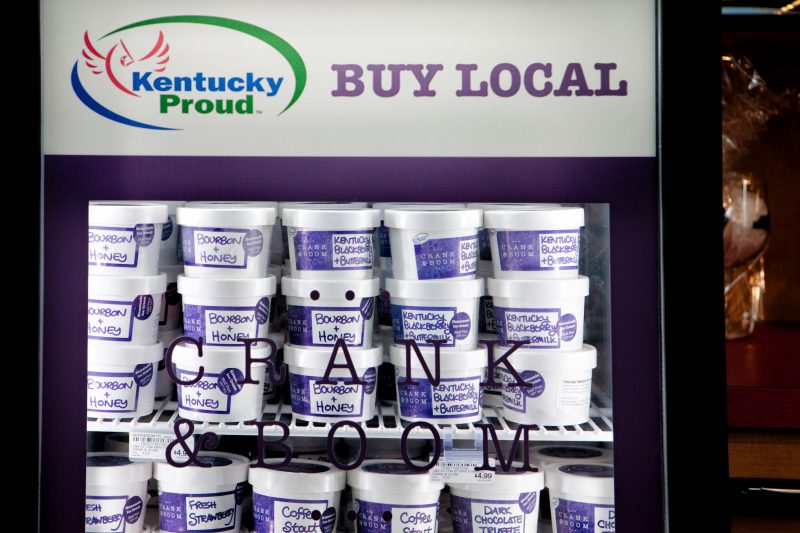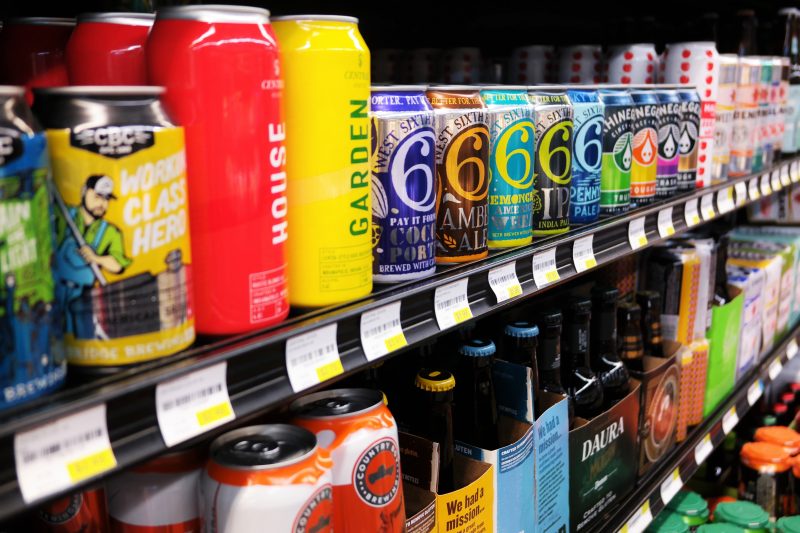Good Foods Co-op, founded in 1972 and located in Lexington, is central Kentucky’s only locally owned and operated cooperative grocery – something our 7,000+ owners are extremely proud of! We focus on local, natural, organic, non-GMO products and wholesome foods while supporting over 250 Kentucky farmers and producers. We offer fresh, local and organic produce; natural and local meats; fresh, sustainably-fished seafood; grab & go entrees; fresh sushi made with organic ingredients; gourmet cheese; olive bar; made-from-scratch baked goods; bulk dry goods, baking needs, and snacks; bulk herbs & spices; body care with ingredient lists you can feel good about; vitamins and supplements; gluten-free foods; and vegetarian/vegan products.
Sustainability Management and the Green Team
- Develop a written Comprehensive Sustainability Plan.
- Designate a Sustainability Coordinator or Green Team responsible for managing sustainability initiatives.
- Hold quarterly Green Team meetings.
- Provide time for quarterly updates from Sustainability Coordinator in upper management meetings.
Awareness, Education, and Outreach
- Include sustainability tips in a monthly newsletter.
- Provide a sustainability information board in a common area such as a break room or kitchen.
- Include a sustainability statement and training in all new hire materials.
- Promote sustainability accomplishments in external marketing materials (website, social media, newsletter, press releases, TV/radio ads).
- Create an annual green employee award to highlight employee sustainability efforts.
- Provide volunteers for community environmental projects annually.
- Host an environmental event at your location.
- Sponsor an environmental booth at an existing community event.
- Participate in a present or attend sustainability workshop.
- Host a Green Check information session.
Energy Efficiency
- Assess, track, and document energy consumption using Energy Star Portfolio Manager or similar program.
- Establish a power-down policy and checklist that includes items such as shutting off lights at night.
- Set water heater thermostats to a maximum of 120 degrees or install an inline water heater.
- Sign up for a green energy program with your electric provider.
- Replace incandescent or CFL lights with LED lights 25-50% replacement.
- Achieve a year-over reduction in energy usage from the baseline of at least 5%.
- Establish a regular filter maintenance policy for your HVAC system.
- Have your HVAC system evaluated every 2 years by a certified service provider.
- Establish a policy for purchasing that requires Energy Star rated appliances and electronics.
- Establish a dress code that encourages employees to dress for thermal comfort.
- Install power strips for computers and equipment to power down during non-business hours.
- Install programmable thermostats and use them to adjust temperature during unoccupied hours.
- Install occupancy sensors in bathrooms, meeting room, and other infrequently used areas.
- Install or upgrade to energy efficient fans.
- Install energy efficient (i.e. Energy Star) rated windows in all conditioned spaces.
- Insulate roof to control energy loss.
- Install efficiency-rated HVAC of minimum standard SEER rating of 14.0.
- Take measures to insulate HVAC system and ductwork to minimize heat loss.
- Assess building envelope and address any leaks.
- Perform external lighting audit.
- Daylight work spaces wherever possible.
Waste Reduction and Recycling
- Implement a basic recycling program.
- Provide clearly marked recycling bins at work stations and/or in common areas. Recycling bins must be paired with a waste bin.
- Train and require janitorial service or staff responsible for cleaning to segregate waste and recyclable materials.
- Use reusable mugs and dishware instead of disposable plates, cups, and utensils.
- Establish a policy for environmentally friendly printing such as two sided printing, reusing copy paper, and electronic document sharing.
- Establish an electronic waste policy that diverts all e-waste away from landfill.
- Create a landfill diversion goal.
- Replace at least 50% of paper stock with post-consumer recycled paper.
Water Conservation
- Assess, track, and document water consumption using Energy Star Portfolio Manager or similar program.
- Conduct a water audit within the last three years. Monitor and record water usage, check indoor and outdoor pipes and fixtures for drips and leaks.
- Establish a policy for purchase of high efficiency (i.e. WaterSense) rated fixtures and appliances.
- Install water efficient faucets in all of the restrooms.
- Install water efficient toilets in all of the restrooms.
Water Quality
- Establish a policy for proper hazardous waste and chemical disposal.
- Organize or participate in a storm drain stenciling.
- Establish a policy for proper disposal of fats, oils, and grease, distribute to staff, and post in key areas.
- Perform a stormwater pollution survey on your property with BGGS staff or other qualifies professional.
- Establish a maintenance program for sanitary sewer lateral lines on your property.
- Post information in restrooms about proper disposal of flushable wipes and other items.
- Coordinate or participate in a community litter clean-up.
- Install outdoor ash trays to prevent cigarette litter, and make pocket ash trays available to staff who smoke.
- Before washing parking lots, sweep debris/litter and do not use cleaners.
Urban Forestry and Landscapes
- Assess the ecosystem services of trees on property using the National Tree Benefits Calculator.
- Establish a sustainability statement for landscape contracts.
- Establish a native species-only plant replacement policy for tree and shrub planting.
- Remove all invasive species from property.
- Establish an Integrated Pest Management policy to reduce use of pesticides in the landscape.
- Establish environmentally friendly lawn care policies to reduce chemical pesticide and fertilizer use.
- Plant a pollinator garden.
- Plant a rain garden.
- Audit irrigation system for leaks (within the last three years).
- Adjust irrigation system to water during cool periods.
Sustainable Purchasing
- Establish a policy for reducing the toxic chemicals/materials in your workplace.
- Establish a policy to purchase non-Styrofoam cups and plates for use at the workplace or at events.
- Establish a policy for purchasing locally, if available.
- Establish a policy for purchasing environmentally-friendly cleaning products.
Transportation Efficiency
- Establish an incentives or recognition program to encourage employees to use alternative transportation, such as carpooling, bicycling, or use of public transit.
- Establish and implement a no-idling policy.
- Conduct a commuter or employee transportation survey.
- Adopt a telecommuting option and make it available to employees.
- Designate parking spaces for hybrid vehicles and/or install EV charging stations.
- Install weather-protected bike storage (indoor or outdoor).
- Participate in a bike to work challenge.
- Place bicycle storage closer than any other designated parking spot.
- Provide employee shower and dressing room facility.
- Apply for a bicycle friendly business award from the League of American Cyclists.
- Offer a group bicycle education/training opportunity.
Innovation
- Install a permeable parking lot.
- Participate in LFUCG Citizen’s Environmental Academy.
Media
.










